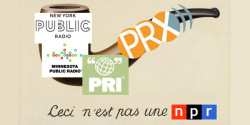As This American Life’s Seth Linn explains, “NPR is the Kleenex of public radio brands.” Just like how you might ask for Kleenex, no matter what brand logo is on the tissue box, or ask for a Coke when you just want a soft drink, many listeners simply think all public radio is NPR.
The reality, of course, is more complex. On The Media’s Chris Neary took a stab at explaining this on this week’s show, in a segment titled “This Is Not NPR.” As someone who has been studying noncommercial radio for the last two decades, I can say he did a pretty good job.
I’ve even seen the confusion come up over some of our reporting about college stations that have been sold by their school’s to public radio outfits. I’ve fielded questions like, “Why is NPR taking over college radio?” Now, the fact is NPR is not taking over any college radio stations. However, most of those public stations now occupying former college radio frequencies happen to be NPR affiliates, but NPR didn’t make the purchase.
NPR is actually a membership organization and network that owns no stations itself. The affiliate stations are voting members who help decide the direction of the network, buy programming, like All Things Considered, from NPR, and also distribute their programming through NPR. But NPR is also not the only game in town.
As the On The Media piece reports, Minnesota Public Radio started its own distribution network in the early 80s after NPR refused to pick up its Prairie Home Companion. Now there are Public Radio International, Minnesota Public Radio and the Public Radio Exchange in the public radio distribution game. Even NPR-distributed programs are not necessarily produced by NPR; for instance, On The Media is produced by New York Public Radio.
It’s also important to note that public radio and public radio stations existed before NPR, which was founded in 1970. Before then there were fewer national programs–though stations did syndicate shows to one another–and even fewer daily or live programs, if any.
That said, the bigger point is that public radio is bigger and older than NPR. Though the confusion remains, despite producers’ and distributor’s very clear efforts to say otherwise in the programs themselves.
Pass me a Kleenex so I can clean off the Xerox machine? Somebody dripped a little Coke on it.



